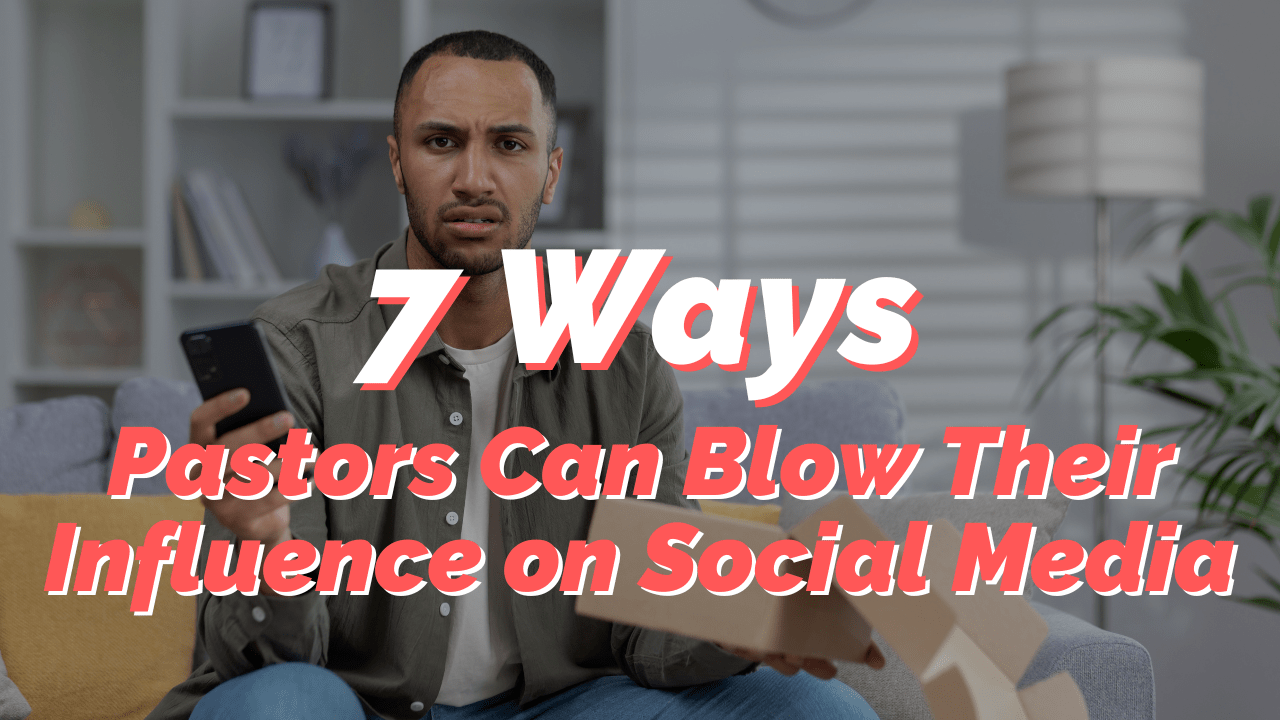There’s no denying that social media is here to stay. Whether you like it or not, social media isn’t going anywhere.
When church leaders embrace it, it’s a powerful tool for reaching members and non-members. As you post, you build influence on social media that helps others see you as a respected authority and someone they can trust.
On the other hand, all it takes is one wrong post to suddenly blow that influence. You could ruin how your entire church family sees you and even hurt the church’s chance for new members. Luckily, it’s easier than you might think to avoid these costly mistakes.
In this article, we’ll cover everything you need to know about managing social media as a church leader. Then, we’ll get into the top 7 ways pastors and other church leaders can blow their influence on social media.
Ready to learn more? Let’s jump in.
Church Leaders and Social Media

First, let’s explore how pastors and church leaders can and should use social media. We’ll explore what it looks like to manage social media as a church leader, the benefits of using social media, and some of the best platforms to use.
Managing Social Media as a Church Leader
Church leaders can benefit greatly from using social media, but it’s important to manage it carefully. The first step is to establish clear goals. Do you want to share your church’s message, connect with the community, or offer spiritual guidance?
Once the goals are set, consistency is key. Posting regularly helps keep followers engaged. Another important aspect is to stay authentic. People respond well to leaders who are genuine. However, it’s also necessary to be mindful of what you post.
Always consider how the message reflects your values as a leader. Lastly, monitor engagement. Replying to comments and interacting with social media users fosters a sense of community.
Benefits of Using Social Media for Church Leaders
Social media networks provide a platform for church leaders to expand their reach. They can spread messages of hope, faith, and love to people who might not attend church in person. By developing social media influence, leaders can become social media influencers, positively impacting many lives.
These platforms allow for easy communication, whether it’s sharing daily devotionals or important announcements. Another major benefit is that social media sites can help grow the church’s community. Through online interactions, people from different areas and backgrounds can connect with the church.
Additionally, it gives church leaders a chance to stay in touch with their congregation, offering support when needed.
Best Social Media Platforms to Use as a Church Leader
Each social media platform has its own strengths. For church leaders, Facebook and Instagram are great for reaching broad audiences. Facebook offers the ability to create groups, events, and share long posts, which can be useful for church activities. Instagram, on the other hand, is ideal for sharing inspirational images, short videos, and stories that resonate with followers.
Internet sites like Twitter/X are helpful for quick updates and engaging with people in real time. YouTube is another platform worth considering, as it allows leaders to share sermons, teachings, and live-stream events. However, it’s essential to stay aware of mental health concerns associated with social media use and make sure interactions are always positive and uplifting.
Is a Church Leader a Social Media Influencer?
A church leader can indeed be a social media influencer. Social media influencers are people who impact others through their online presence, and church leaders often do this by sharing messages of faith, hope, and encouragement.
While businesses hire social media influencers to promote products, church leaders focus on spreading spiritual guidance. They may not be consumer influencers or celebrity influencers, but they still influence the beliefs and actions of their followers.
Social media usage among church leaders allows them to connect with their congregation in new ways. By understanding the social media habits of their audience, church leaders can tailor their messages to reach more people effectively.
For example, posting regularly and engaging with comments helps maintain strong relationships online. Although their goals are different from those of consumer influencers, church leaders can still use social media to make a meaningful impact on the lives of others. Whether it’s through sharing sermons, devotionals, or encouraging words to those struggling with poor mental health, their influence can extend far beyond the walls of the church, reaching people who might not attend in person but still seek spiritual connection online.
Top 7 Ways You Might Ruin Your Social Media Reputation

And there you have it! Now, let’s move on to our list of the top 7 ways a pastor or church leader may blow their influence on social media. From criticizing others to airing out dirty laundry, there are many things an influencer can do to lose the respect of their followers.
We don’t want that to happen to you! Thankfully, if you’re able to avoid these 7 common pitfalls, there’s a good chance you won’t lose the influence you are building on social media.
Let’s dive in.
1. Posting When Angry
According to Statista, 53% of people use Facebook several times a day in the US. Clearly, it’s a great place to reach the majority of your members and even reach out to potential new members. And that’s just one social media platform! Think about how much people are on Instagram, Twitter, and more.

You’ll need a public page or profile to post on these platforms. The only problem is everyone will see your posts, even those that you posted in a moment of anger or frustration.
Pitching fits on social media isn’t going to win you or your church any points. Instead, followers of your social media account may see you as too rash and move on to someone else.
2. Criticizing Others
Every person is critical of others, at least a little. But when it comes to social media, it’s easy to sit behind a keyboard and criticize everyone from church members to complete strangers.
One of the quickest ways to ruin your influence on social media is to blatantly criticize or talk negatively about others. A judgmental church leader could push away members and show potential members that they may not be accepted. Remember, keep judgments to yourself to avoid hurting others
3. Venting About Your Own Problems
It’s okay to vent about having a bad day now and then, but when it becomes a habit, it gets annoying. It might make those following your profile believe that you only care about yourself and your own problems.
After all, they’re following you to learn more about you and the church and to get inspired now and then. Talk about yourself to remind everyone that you’re human too, but stay focused more on the church.
4. Airing Dirty Laundry

The millions of people on social media don’t need to know about a fight you just had with your spouse or that questionable thing one your church members did over the weekend.
Part of creating a solid influence on social media is building trust. If followers see that you air everyone’s dirty laundry, they won’t trust you or the church.
5. Diving Into Politics
No matter what your political views might be, social media is not the place for them. It’s rare for everyone to agree and it just leads to unnecessary arguments and tension. The day of and after the 2016 election was a day of unfriending and blocking on Facebook. If church leaders are using social media to try to influence political views, it’ll just drive people away who don’t agree.
6. Attempting To Be Perfect
No one is perfect, but it’s tempting to try to create that belief, especially as a church leader. You know others depend upon your leadership and you don’t want to let them down.
This is why it’s okay to post something personal about yourself, such as having a bad day or acknowledging a mistake you made. When you seem perfect, it may make people believe the church only wants perfection and that’s the last thing you want people to believe.
7. Having Private Conversations Publicly
At some point, a member or non-member will post something rather personal or derogatory on your page or profile. They’ll do it publicly and your first instinct might be to handle the situation publicly. To create a better influence on social media, handle some topics privately.
If someone posts about a failing marriage, tell them you’re going to message them privately. This shows you’re respectful and in turn, makes people respect your church more too.
Bonus: Acting Like a Business
Every social media user is bombarded with advertisements and people trying to sell to them hundreds of times a day while on social media. For most of us, it’s become common to completely tune ads out, essentially ignoring them as we scroll. A quick way to become ignored or at worse discredited, is to treat your church’s presence on social media as a business.
While building your influence on social media is in a sense a marketing strategy for growing your church, you shouldn’t treat it the same way you would a product or service you’re trying to sell. You’re in the business of leading and shepherding, not social media marketing. Stay authentic, genuine, and Christ-centered. Don’t try to shove your church down people’s throats with what are essentially ads.
Maintaining the Right Influence on Social Media

Your influence on social media could bring in new members, but you have to create the right influence. Think carefully before you post anything. If you’re angry, wait a while to post to avoid the all too common social media post regret. If you feel like you want to criticize someone publicly, take time to think through the possible consequences of your actions.
We hope this article was helpful to you! Let us know in the comments below if you can think of any other ways church leaders can blow their influence on social media. God bless!
Want a website that helps build a positive influence? Find out more about our church web design services today.

